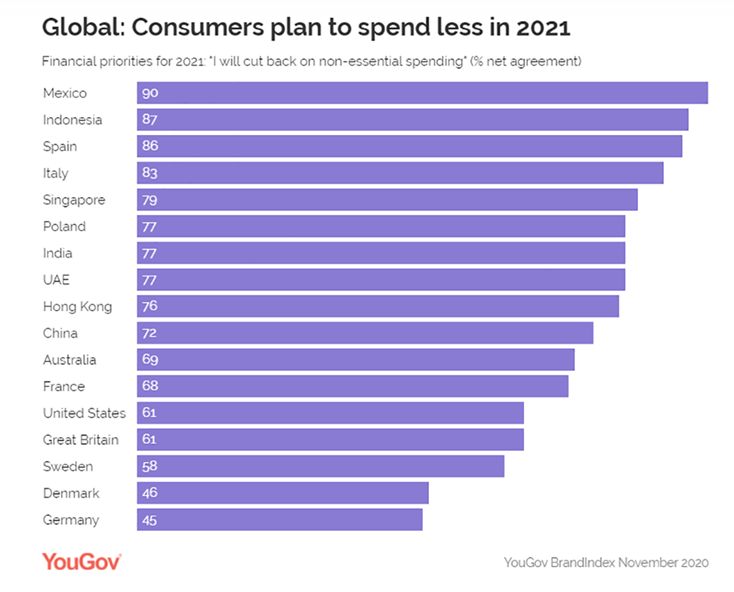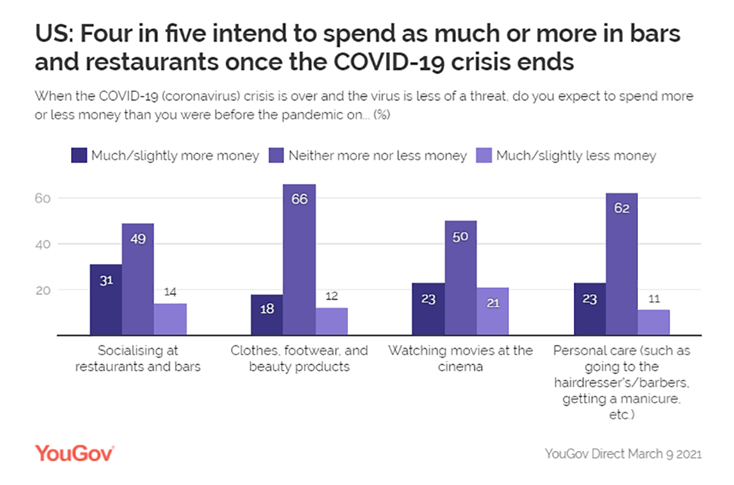Global: Covid-19 and Consumer Spending
YouGov’s Global Banking & Finance Report indicates that, when asked, consumers say they intend to limit non-essential spending in 2021.

Download YouGov’s Global Banking & Finance Report

In all but two of YouGov's 17 international markets (Denmark 46%; Germany 45%) a comfortable majority said they intended to cut back – and at the other end of the scale, in countries such as Spain (86%), Italy (83%) and Singapore (79%), this rose to almost four in five respondents.
But will the intention to cut back be reflected in the post-pandemic reality – or will pent-up demand for activities that have been discouraged or limited drive spending upwards in some key areas of commercial activity?
YouGov conducted a survey following the launch of the white paper to find out.
More Americans Plan to Increase – Rather than Decrease – the Amount They Spend on Socialising in Bars and Restaurants Once the Crisis Lifts
In the US, data from YouGov Direct reveals that – far from cutting back – US consumers plan to increase their spending (relative to pre-pandemic levels) in certain categories once the pandemic subsides.
When asked whether they expect to spend more or less money socialising at restaurants or bars, three in ten say they’re planning to spend more money (31%), next to just 14% who say they intend to spend less. Half anticipate that their expenditure will return to pre-pandemic levels (49%).

It’s a similar story with personal care appointments such as getting a haircut or visiting a manicurist: most intend to spend neither more nor less money than theythe same as they were before (61%), but those who do plan to change their habits are more likely to increase their outlay rather than decrease it. Just under a quarter expect to spend more (23%), while just one in nine intend to spend less (11%).
Even in entertainment categories where the pandemic has hit businesses particularly hard – i.e. movie theatres – Americans who plan to up their spending slightly outnumber those who plan to lower it. Nearly a quarter say they expect to buy more movie tickets (23%), a fifth (21%) expect to visit the cinema less, and most don’t intend to change their spending either way (50%).
We can potentially attribute this to the response many film companies have had to the pandemic: while some major releases such as No Time to Die and Fast and Furious 9 have been delayed to give them a proper theatrical run, others – such as Wonder Woman 1984 and Raya and the Last Dragon have had a hybrid rollout, debuting in cinemas and on streaming services at the same time.
And with more consumers leaving the house (and with a greater need to look presentable for work or social reasons), almost a fifth say they plan to spend more on clothes, footwear and beauty products (18%) – compared to 12% who plan to spend less and two-thirds (66%) who don’t intend to change their spending in either direction.
The pandemic may have a significant impact on the money available for consumers to spend, which could, in turn, influence their stated intentions to cut back. Digging deeper into Italy, for example – where over four in five (83%) say they plan to cut back – reveals that two-thirds of consumers polled since the beginning of the pandemic were worried that it would severely affect their finances (65%).
Considering just half said they were worried that they might become unwell and die (49%), it’s clear that the financial impact of Covid-19 weighed heavily on these consumers.
But while the US is not necessarily reflective of all other markets, it does suggest that, as much as consumers might intend to limit their expenditure, many also expect to either revert to their pre-pandemic spending or even increase it – with those planning to cut back on socialising, personal care, or visiting the cinema representing a minority.
Download YouGov’s Global Banking & Finance Report
Methodology: YouGov polled 1,200 US adults. The survey was conducted on March 9, 2021 between 4:24 p.m. and 18:23 p.m. Eastern time. The survey was carried out through YouGov Direct. Data is weighted on age, gender, education level, political affiliation and ethnicity to be nationally representative of registered voters in the United States. The margin of error is approximately 4.1% for the overall sample.